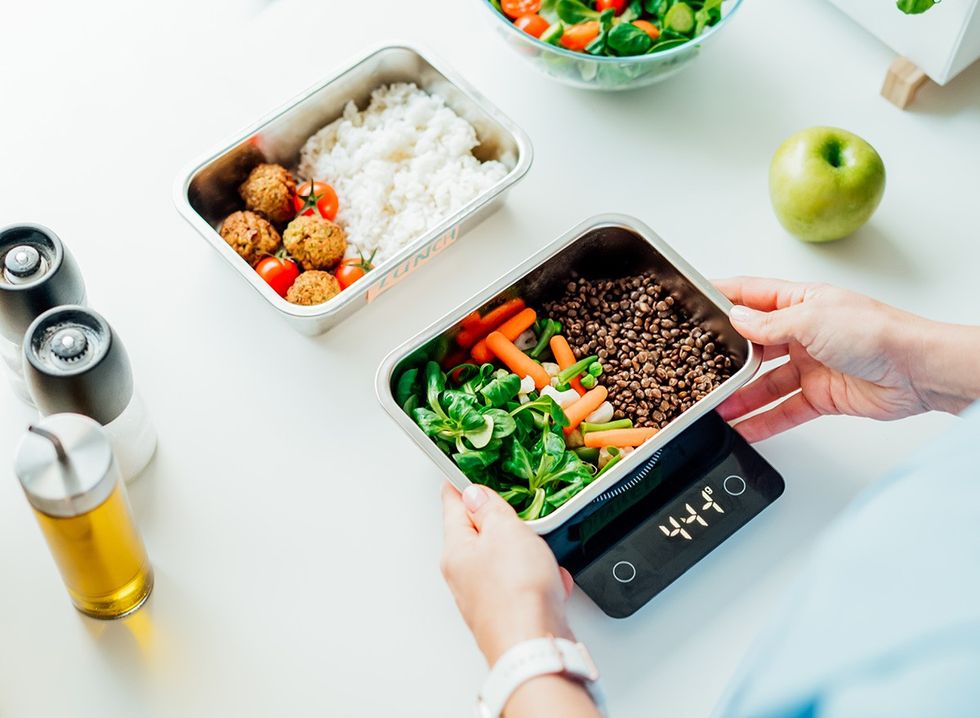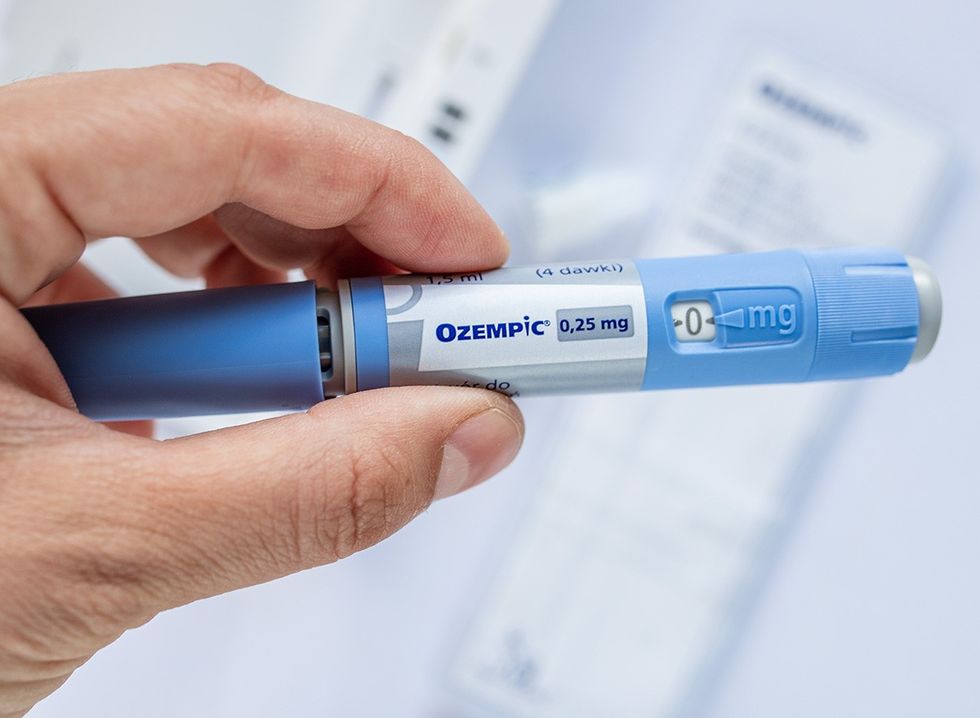Sodium is important for health—but it is possible to have too much of a good thing. “The sodium found in salt is an important electrolyte needed for muscle contractions, nerve impulses and balancing hydration in the body,” clinical dietitian Amanda Meadows tells Houston Methodist. “This makes sodium an essential mineral, but your body only needs so much of it. Many people eat more salt than the body needs and, over time, there are consequences to this.” Here are10 red flags you’re eating too much sodium.
High Blood Pressure

Too much sodium can cause high blood pressure. “As your blood volume increases, your heart has to work harder to pump blood throughout your body,” Meadows says. “This then increases pressure in your arteries. What's more is that when the heart is pumping harder, it places pressure on the vessels in every organ, including the kidneys.”
Poor Sleep

Too much sodium can disrupt sleep. “Eating too much sodium (especially in the evening) can mess with your sleep,” says the Cleveland Clinic. “A spike in blood pressure and sudden urges to get a drink or pee can interrupt your ZZZs.”
Bloating

Bloating could be a sign of too much sodium. “If your kidneys can't eliminate the salt you're taking in from your diet, sodium starts to build up in your body,” Meadows says. “And when you're holding on to more sodium, your body tries to dilute it with water — increasing your blood volume and causing you to retain fluid.”
Increased Thirst

Sodium can cause increased thirst. “Recent research shows that higher levels of sodium won’t necessarily cause people to be thirstier,” says the Cleveland Clinic. “But despite that, some people can’t help but chug down more liquids after eating salty foods.”
Heart Disease and Stroke

Too much sodium can cause heart disease, experts warn. “Eating too much sodium can increase your blood pressure and your risk for heart disease and stroke,” says the CDC. “Together, heart disease and stroke kill more Americans each year than any other cause.”
Kidney Issues

Too much sodium can put pressure on the kidneys. “In most people, the kidneys have trouble keeping up with excess sodium in the blood,” according to Harvard University. “As sodium accumulates, the body holds onto water to dilute the sodium. This increases both the amount of fluid surrounding cells and the volume of blood in the bloodstream.”
Fatigue

Too much sodium can cause chronic fatigue. “Eating a meal that’s high in sodium at dinnertime can contribute to sleep disturbances, in part due to an increase in blood pressure and fluid retention,” Sandra Darling, DO, MPH, tells the Cleveland Clinic. “The result may be restless sleep, frequent awakenings and not feeling rested in the morning. I’ve experienced this first hand after going out for pizza. It’s a treat and a fun night out, but the after-effects are not fun. With too much salt in your bloodstream you may not sleep well that night — and feel tired or groggy the next day.”
Headaches

Too much sodium can cause dehydration, which can trigger headaches. “These headaches tend to be more painful than a mild one, giving a throbbing sensation as the blood vessels are being expanded,” nutritionist Pippa Hill tells The Independent. “They tend to come on between an hour or two after you’ve eaten, as sodium levels rise through the body.”
Swollen Hands and Feet

Swollen feet and hands could be a sign of excess sodium. “When too much salt is consumed, the body retains the extra sodium and increases the fluid outside of the cells,” registered associate nutritionist Olivia Burley tells The Independent. “This causes the kidneys to have reduced function, remove less water and therefore increase blood pressure.”
Brittle Bones

Some studies suggest too much sodium can raise the risk of bones weakening. “Excessive sodium intake appears to be a risk factor for bone fragility,” says Kiyoko Nawata, PhD, via Science Daily. “It is therefore important to consider excessive sodium intake in dietary therapy for osteoporosis.” And if you enjoyed this article, take advantage of these 15 Quick Ways to Lose Body Fat Percentage in a Week.














 Shutterstock
Shutterstock Shutterstock
Shutterstock Shutterstock
Shutterstock Shutterstock
Shutterstock Shutterstock
Shutterstock Shutterstock
Shutterstock Shutterstock
Shutterstock Shutterstock
Shutterstock Shutterstock
Shutterstock Shutterstock
Shutterstock Shutterstock
Shutterstock Shutterstock
Shutterstock Shutterstock
Shutterstock Shutterstock
Shutterstock Shutterstock
Shutterstock Shutterstock
Shutterstock


 Shutterstock
Shutterstock
 Shutterstock
Shutterstock Shutterstock
Shutterstock Shutterstock
Shutterstock Shutterstock
Shutterstock Shutterstock
Shutterstock Shutterstock
Shutterstock
 Shutterstock
Shutterstock Shutterstock
Shutterstock Shutterstock
Shutterstock Shutterstock
Shutterstock Shutterstock
Shutterstock Shutterstock
Shutterstock Shutterstock
Shutterstock Shutterstock
Shutterstock Shutterstock
Shutterstock Shutterstock
Shutterstock

 I'm a Nutritionist and These 9 High-Protein Snacks Keep My Clients Full While Losing 50 Pounds
I'm a Nutritionist and These 9 High-Protein Snacks Keep My Clients Full While Losing 50 Pounds
 Shutterstock
Shutterstock 2. Processed FoodsShutterstock
2. Processed FoodsShutterstock Shutterstock
Shutterstock Shutterstock/Prostock-studio
Shutterstock/Prostock-studio Shutterstock
Shutterstock Pro TipsShutterstock
Pro TipsShutterstock Shutterstock
Shutterstock Shutterstock
Shutterstock Shutterstock
Shutterstock Shutterstock
Shutterstock Don’t Drink as Much AlcoholShutterstock
Don’t Drink as Much AlcoholShutterstock Most Women on GLP-1s Are Making a Few Common MistakesShutterstock
Most Women on GLP-1s Are Making a Few Common MistakesShutterstock Soda and Sugary DrinksShutterstock
Soda and Sugary DrinksShutterstock Shutterstock
Shutterstock Eat BreakfastShutterstock
Eat BreakfastShutterstock And Improve Insulin SensitivityShutterstock
And Improve Insulin SensitivityShutterstock Belly Flab Strip Tip: Sugar and Fat Calories Leave Its Mark on Your BodyShutterstock
Belly Flab Strip Tip: Sugar and Fat Calories Leave Its Mark on Your BodyShutterstock Shutterstock
Shutterstock The Drugs Mimic the GLP-1 Hormone Naturally Produced by the BodyShutterstock
The Drugs Mimic the GLP-1 Hormone Naturally Produced by the BodyShutterstock 3. Deep-Fried ItemsShutterstock
3. Deep-Fried ItemsShutterstock